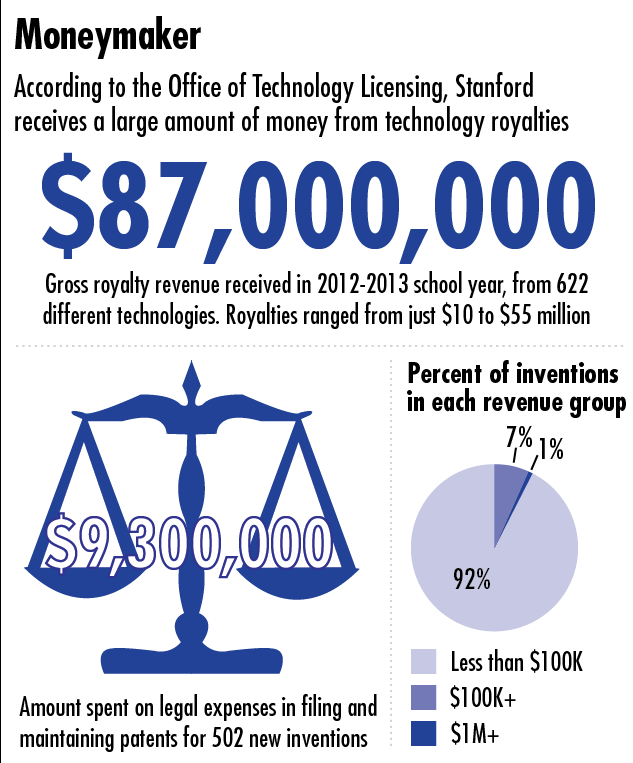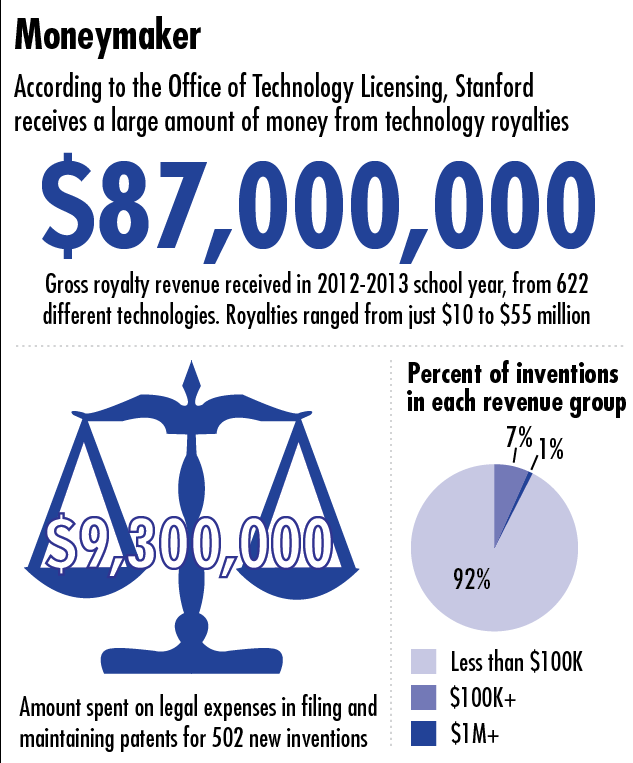
Even as federal patent reform legislation continues to spark debate between startups and patent-holding entities, Stanford — a leading source of innovation and patents — has remained neutral.
The Innovation Act passed the House of Representatives by a vote of 325 to 91 in December, backed by several industry and consumer groups. The Senate has begun to consider a set of similar bills, which will eventually be consolidated into a single bill and then reconciled with the House version.
The bills under consideration generally seek to reduce unwarranted patent litigation by so-called “patent trolls,” a phenomenon that incurred an estimated $29 billion in cumulative damages in 2011 alone.
Why some universities oppose reform
Jacob Sherkow, a fellow at Stanford Law School’s Center for Law and the Biosciences, explained that many universities oppose change because current laws have allowed them to benefit in terms of both suing and defending. For example, in the recent case of Carnegie Mellon University v. Marvell Technology Group Ltd et al, Marvell had to pay the university $1.17 billion in damages.
“I think the universities are reticent against change,” Sherkow said. “To the extent that they feel that their patents have been infringed, they have been remarkably successful in suing.”
The main aspect of the bill to which universities have objected is “fee shifting.” The provision may require the loser in a case to pay the litigation costs of the other party, countering the common tactic practiced by patent trolls of forcing defendants to settle rather than risk losing in court while incurring substantial legal expenses.
“There are a couple of aspects to the bill [that universities are against] that go in and out depending on what week it is, including joining all of the inventors [and] making sure parties sue in their real name,” Sherkow said.
He also explained that universities are rarely sued by patent trolls since the schools are more likely to win in court. However, according to Sherkow, some universities will sell patents to patent trolls for a profit.
“There are some instances in which universities do sell patents to patent trolls,” Sherkow said. “Berkeley has been doing this for a while.”
“Universities also buy patents from patent trolls and then sue,” he added. “So in that sense, universities in many ways sometimes act as their own patent trolls: they have a patent, they don’t necessarily practice the technology themselves, and they sue other people.”
The discussion of whether or not universities are patent trolls has been ongoing for many years. Professor of Law Mark Lemley published a well-known paper in 2007 that concluded that universities may act like patent trolls but in fact do not typically do so.
Stanford’s stance
Katherine Ku, the director of Stanford’s Office of Technology Licensing, explained that Stanford is neither for nor against the bill.
“We [Stanford] have opinions, but we’ve not written to our congressmen or anything like that,” Ku said.
In terms of Stanford’s interactions with patent trolls, according to Ku, the University is only interested in working with companies that will develop actual technologies.
“Certain companies have come around and offered to buy up patents, or they want to have enough rights so that they can sue others,” Ku said. “We’re not really interested in working with companies who aren’t developing the technology themselves.”
“If an entity who held a lot of patents would come to us and they were willing to develop a particular technology in the area that they have these patents and we have an agreement that shows that they were going to develop it, we would consider licensing them,” she added.
Ku mentioned that one aspect of the bill that Stanford does not support is fee shifting.
“Let’s say two big companies sue each other. They’re willing to take the risk, and they spend a lot of money,” Ku said. “But if a university were to sue a company and then we lost for some reason, it would be very expensive for us. I think it would be a total disincentive for universities or individuals to sue.”
She also expressed ambivalence about provisions that would require the patent owner, not just the company acting as the plaintiff, to be listed in the demand letter.
“The only way we get our technologies developed is if we license them to someone,” Ku said. “Many times when there’s a litigation, it’s our licensee who’s suing, and we may have to be named because we’re the owner of the patent … We’re okay to be known [as] the patent holder, but we don’t want to be at the front end of this.”
In general, Ku explained that the pressure for patent reform stems mainly from concerns in the high tech sector.
“The drug companies, the pharmaceutical companies, the biotech sector [are] much less worried about this,” Ku said.
“I do not feel that we are a patent troll so I would love to a way to craft a legislation so it doesn’t apply to universities or our kind of activities,” she added.
The problem of patent trolls
Matt Levy, patent counsel for the Computer and Communications Industry Association, explained that patent trolls have historically been a prominent issue for technology companies. Under current laws, patent trolls can sue with very little risk.
Levy also spoke about potential reforms that would help prevent trolls from abusing the system and would ensure that a case is reasonable.
“Patent trolls will often send threatening letters to a company … saying ‘We have this patent that you might infringe so give us money by a certain date,’” Levy said. “There have been cases where patent trolls have actually sent letters with a pretty good idea that the people they were sending them to did not infringe [the patent].”
Patent trolls have especially had an impact on small companies and startups. According to Levy, some businesses have had to scale back or give up their companies all together as a result of money lost to patent trolls.
“Money is being drained away to pay patent trolls instead of being used to make new products or hire new people,” Levy said. “Last year there were something like 4800 companies sued by patent trolls, and most of those will settle. Of course, that doesn’t even include all the companies that were hit with demand letters but didn’t actually get sued.”
“The technology industry has for a long time been raising concerns about patent trolls and how they are negatively impacting the patent system and the economy by abusing the patent litigation process,” echoed Matt Tanielian, executive director for the Coalition for Patent Fairness, which represents tech companies including Google, Cisco and Verizon.
Tanielian explained that while the current standards for when fee shifting would occur are still under discussion, he does not believe universities would be affected since they are unlikely to file unreasonable cases.
“If you look at the language, it seems to me that judges have discretion when to apply [fee shifting],” Tanielian said. “That they would choose to apply it against universities … seems a very unlikely outcome.”
“There is no desire on behalf of people supporting reform to at all damage universities ability to innovate through the legislative process,” he added. “The goal is to deal with bad actors and their actions, not to hurt universities.”
Where the bill will go
Sherkow explained that the future of the bill will depend on what it looks if it passes through the Senate.
“There’s a question of whether or not … the president is going to sign it or not. The White House recently announced it is taking its own actions regarding patent reform,” Sherkow said. “So to the extent that whatever happens in the patent reform bill conflicts with what’s going on at the White House, there is a not insignificant chance that the president may have second thoughts about signing it.”
Sherkow also argued that the bill will minimally affect universities.
“For universities like Stanford that have endowments that run up into the double digit billions dollars, I truly cannot imagine that that’s going to have any effect whatsoever,” Sherkow said. “I don’t even think it will cause Stanford to think twice about enforcing its patent rights to the extent it feels threatened.”
The Senate Judiciary Committee’s markup began this Thursday and will continue until a compromise is found.
“The legislative process is a very complicated one sometimes, and it’s possible that it could slide to next week,” Tanielian said. “But the possibility that something will be done is pretty high. Given a legislative environment where not a lot gets accomplished, this is a bipartisan bill that’s already passed the House that has a fairly good chance.”
Contact Kylie Jue at kyliej ‘at’ stanford ‘dot’ edu.
